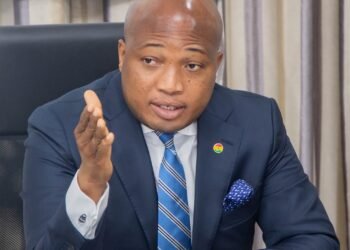As Ghana approaches the 2025 fiscal year amidst a tense political climate, attention has turned to the pressing issue of the government’s budget approval process.
Ghanaian lawmakers and financial experts are grappling with the implications of a delayed vote on the Q1 budget and its potential effects on economic stability.
Professor Godfred Alufar Bokpin of the University of Ghana Business School discussed the implications of a delay in parliamentary deliberations on budget approval and how political dynamics could impact economic governance.
In the Ghanaian parliamentary system, budget approval for the coming fiscal year is essential to ensure the smooth functioning of government operations. He explained:
“When it comes to the expenditure in advance of our operation for the first three months of 2025, I think there isn’t much cause for concern, we will get over that. We are working on all of this being done and getting Approval by resolution under article 180 of the 1992 Constitution as well as section 23 of the Public Financial Management Act is crucial.”
Professor Godfred Alufar Bokpin of the University of Ghana Business School
With the budget vote anticipated to occur by December 31, Prof Bokpin underscored the importance of a timely resolution, which he believes will enable governmental continuity. However, he points out that a failure to pass this budget could lead to potential economic and operational disruption.
Historical Precedents and Timeliness
Drawing from past events, Professor Bokpin explained that there has been precedent for budget votes on expenditure in advance of appropriation occurring in time. He referenced the 2020 budget approval, noting:
“Four years ago, by this time, for clarity, the expenditure in advance of our operation was presented on the 28th of October by the then honorable Ken Ofori-Atta on the authority of the President consistent with Article 180 of the 1992 Constitution and Section 23 of the Public Financial Management Act.”
Professor Godfred Alufar Bokpin of the University of Ghana Business School
This historical context, he suggested reflected a standard that current lawmakers would do well to emulate.
“The budget, or whether is the vote on account or the expenditure in advance of appropriation, is not only just to enable the government to be able to withdraw from the consolidated fund to keep government machinery running… but the reality also is that the expenditure in advance of appropriation also helps stakeholders to plan and see the direction government is going.”
Professor Godfred Alufar Bokpin of the University of Ghana Business School
Parliamentary Divisions and Political Realities

One of the primary challenges facing budget approval is the political division within Parliament. The major political parties, the National Democratic Congress (NDC) and New Patriotic Party (NPP) appear divided, which complicates the approval process. Prof Bokpin reflected on the dynamic, observing:
“What we see happening right now across the two main political divides is the situation where the MPs themselves are prioritizing their next four years in Parliament over the current business of government.”
Professor Godfred Alufar Bokpin of the University of Ghana Business School
This statement highlights a key tension: as the election draws near, members of Parliament may focus more on securing their political futures than on advancing national interests.
Prof Bokpin emphasized that this behavior extends across party lines, as both majority and minority members display a tendency to prioritize their seats over legislative obligations.
Risks of Delay and Economic Implications
A delay in budget approval could have significant economic repercussions. Without the necessary financial resolutions, the government could face obstacles in meeting its obligations, potentially impacting public services and infrastructure projects.
Professor Bokpin explained that the primary risk is not an inability to manage funds but rather the uncertainty it creates for planning and governance.
“All this uncertainty overall does not help us. This is not only about enabling government machinery to function but also allowing stakeholders to process the information.”
Professor Godfred Alufar Bokpin of the University of Ghana Business School
The potential impact of delays extends beyond government operations. As Prof Bokpin suggested, when financial plans are uncertain, it creates ambiguity for businesses and other stakeholders in Ghana’s economy, who rely on clear fiscal directives for decision-making.
The Role of Political Maturity
He expressed hope that lawmakers can use this moment to strengthen Ghana’s political institutions:
“Without challenges like this, without infractions or differences like this, it will be difficult for us to see how we are maturing in our democratic process.”
Professor Godfred Alufar Bokpin of the University of Ghana Business School
This view reflected an optimistic perspective on political disagreements, suggesting they could foster growth in Ghana’s democratic processes. However, he tempered this by emphasizing the need for both parties to prioritize the national interest.
Prof Bokpin’s analysis revealed that the ongoing parliamentary discussions over Ghana’s budget approval process have substantial implications for economic stability and institutional maturity, as he concluded:
“I’m hoping that we’ll be able to rise above the ways and put the common interest above the self and party interest.”
Professor Godfred Alufar Bokpin of the University of Ghana Business School
Meanwhile, as Ghana’s Parliament strikes (adjournment) it would likely impact the approval of the national budget negatively, the absence of these discussions could serve as a defining moment in Ghana’s economic and political landscape, underscoring the critical balance between democratic principles and pragmatic governance.
READ ALSO; Gloria Kani Shares Challenges Single Mothers Face























